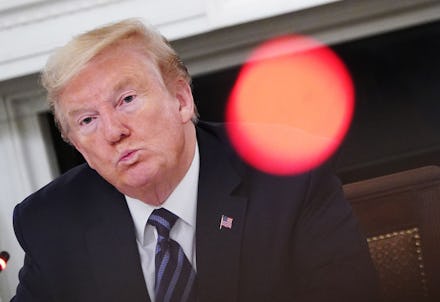Don't expect any more coronavirus relief from the government anytime soon

The Trump administration's ongoing efforts to stick its fingers in its ears and "la la la" away the seismic implications of the ongoing coronavirus pandemic continued apace this week, with White House National Economic Council director and notorious wrong-opinion-haver Larry Kudlow announcing a temporary stop to formal coronavirus relief package negotiations.
"We put all this money in, which is fine. It’s well worth it. Let’s see what happens,” Kudlow told reporters outside the White House on Friday. “As we move into the reopening phase this month, maybe spillover to June, let’s have a look at it before we decide 'who, what, where, when.'" Congress passed the $2 trillion CARES Act stimulus bill in March.
Kudlow stressed that informal conversations are still taking place, but his statements effectively meant that for the next month or so there will be no concrete federal action to alleviate the pronounced economic suffering (to say nothing of actual, physical suffering) affecting millions of un-and-underemployed Americans who have found their lives upended thanks to coronavirus.
Shortly after Kudlow's remarks, however, White House Press Secretary Kayleigh McEnany insisted that President Trump did indeed have a plan to help pull America's economy out of its historically steep nosedive. That plan, however, consisted largely of broad, longstanding Republican priorities like "deregulation" and payroll tax cuts — the sorts of things that might benefit some businesses, but are largely meaningless to ordinary people who are suddenly facing the prospect of total financial ruin.
Notably, McEnany made a point to emphasize that any subsequent relief package is contingent upon, you guessed it, negotiations between the White House and Congress — the same formal negotiations which were declared mostly dead by Kudlow just hours earlier.
While the White House may be split on how, and how quickly (if at all), it wants to pursue further relief for individual Americans, some congressional Republicans are decidedly less enthusiastic about more stimulus checks.
"Well people in hell want ice water too,” Louisiana Sen. John Kennedy quipped Friday. “I mean, everybody has an idea and a bill, usually to spend more money. It’s like a Labor Day mattress sale around here.”
"The real stimulus that’s going to change the trajectory that we're on is going to be the economy, not government checks,” South Carolina Sen. Lindsey Graham said a few days earlier. “I doubt there will be another payment.”
But where Republicans are getting cold COVID feet, some Democrats are beginning to think even bigger. On Friday, Sens. Kamala Harris (Calif.) and Ed Markey (Mass.), along with Sen. Bernie Sanders (I-Vt.) announced plans to introduce the Monthly Economic Crisis Support Act — a bill that would expand upon the initial $1,200 stimulus check by providing a monthly stipend of $2,000 to help households affected by the pandemic-induced economic collapse get by.
The bill is in some ways a Senate counterpart to House legislation proposed in April, which also proposed a $2,000-per-month continuous government payment throughout the duration of the pandemic.
In a statement accompanying the announcement of the bill, Sanders stressed the need to provide adequate financial protections for individuals and households, not just corporations.
“As a result of this horrific pandemic, tens of millions of Americans are living in economic desperation not knowing where their next meal or paycheck will come from,” Sanders said. “The one-time $1,200 check that many Americans recently received is not nearly enough to pay the rent, put food on the table, and make ends meet. During this unprecedented crisis, Congress has a responsibility to make sure that every working-class household in America receives a $2,000 emergency payment a month for each family member."
"If we can bail out large corporations, we can make sure that everyone in this country has enough income to pay for the basic necessities of life," he added. Still, with formal negotiations temporarily on hold, it looks as if any sort of new financial relief is going to have to wait.